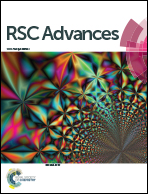A millifluidic chip for cultivation of fish embryos and toxicity testing fabricated by 3D printing technology†
Abstract
Zebrafish (Danio rerio) serves as a popular animal model for in vivo acute toxicity evaluation with the Fish embryo test (FET). Over the last few years there has been an effort to develop various systems for a high-throughput zebrafish embryo cultivation and FET. In this paper, we present a novel design of a millifluidic system fabricated by 3D printing technology and we evaluate its functional properties on Danio rerio embryos cultivation and toxicity testing. The development and the optimization of the millifluidic chip was performed by experimental measurements supported by numerical simulations of mass and momentum transport. The cultivation chip with two inlets and one outlet consisted of two individual channels placed on top of each other and separated by a partition with cultivation chambers. An individual embryo removal functionality, which can be used during the cultivation experiments for selective unloading of any of the cultivated embryos out of the chip, was added to the chip design. This unique property raises the possibility of detailed studies of the selected embryos by additional methods. Long-term (96 hours) perfusion cultivation experiments showed a normal development of zebrafish embryos in the chip. Model toxicity tests were further performed with diluted ethanol as a teratogen. Compared to the FET assays, an increased toxic effect of the ethanol on the embryos cultivated in the chip was observed when the median lethal dose and the percentage of the morphological end-points were evaluated. We conclude that the presented 3D printed chip is suitable for long-term zebrafish embryo cultivations and toxicity testing and can be further developed for the automated assays.



 Please wait while we load your content...
Please wait while we load your content...